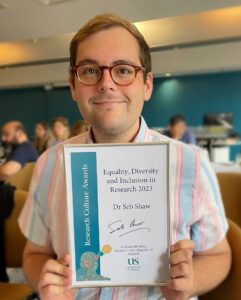Dr Sebastian Shaw is an Assistant Professor in Medical Education at Brighton and Sussex Medical School. He is also the Research Lead for Autistic Doctors International. He is autistic, ADHD, and dyslexic – and has hypermobile Ehlers-Danlos Syndrome. He took the time to speak with us about his career and research, as well as sources of support for autistic doctors.

Why medicine?
Having come from a somewhat atypical background, I felt a drive to do something worthwhile with my life. I knew I wanted to enter a career that could do some good and, after some work experience and research, I set my mind on medicine in my teens.
What do you enjoy about it?
Juggling academic and clinical roles is certainly not without its challenges. However, I find that their differences complement one another well and keep me interested and motivated. I really enjoy feeling like I am making a difference, whether on an individual level in my clinical role, or a larger system level in my academic role.
You’ve said your autism diagnosis gave context to some early-career challenges. Can you give any examples?
There were a few things I struggled with when I first qualified. I really remember a mismatch between what others told me and how I saw myself. I got excellent feedback from colleagues and supervisors, but felt like I was really struggling, even if I could not articulate why (even to myself!).
I was exhausted and overwhelmed after each shift. I began to live for work, using any time off to recover.
Looking back, and passing this through an autistic lens, I was in a new hospital, in a new role, surrounded by intense sensory stimuli and frequent unpredictability.
You recently led a research project into the experiences of autistic doctors. What are the most notable findings?
There were so many interesting findings in that particular study. Some of the most important for me were those that helped to explore the impact the neurodiversity movement may be having on the profession.
For example, despite most respondents feeling being autistic came with challenges at work, most also felt being autistic brought strengths to their work. This reinforced the idea of the neurodiversity paradigm, which argues that autism is a difference (not a disorder, impairment, or superpower), which can lead to strengths and challenges depending on the match between the individual person and their external circumstances.
Furthermore, most preferred to use identity-first language (“autistic doctor”) over person-first language (“doctor with autism”) – and those preferring person-first language were more likely to consider autism to be a disorder. This really seemed to echo broader community perspectives.
We know there is a stigma among doctors about reaching out for support. Can this be even harder for autistic doctors?
Oh, absolutely. We also always need to think about these things intersectionally too. While I am multiply neurodivergent and gay, I undoubtedly remain in a position of privilege. Disclosing being neurodivergent may still feel highly unsafe for some – let alone taking those next steps to ask for help.
Medical education and training can have the unintended side effect of driving maladaptive perfectionism too. I suspect this might also come more naturally to those of us who are autistic, making it harder for us to accept that we are perfectly good autistic people and not broken non-autistic people.
Shame may also be an important factor here. My colleague Dr Mary Doherty has become interested in the concept of shame, and how this might apply to things like disclosure. While we talk about stigma more readily nowadays, we still rarely speak openly about shame – or the internalisation of how living and working in problematic systems can make us feel about ourselves, our abilities, or even our self-worth.
What strengths do autistic doctors bring to medicine?
There is an old saying that if you have met an autistic person, you have done just that – met one autistic person. The same concept would apply here. However, in the broadest sense, it could be (and has been) argued that medicine is well suited to autistic minds. For example, the ability to step back and analyse communication and behaviour – that can be incredibly beneficial to many specialities. A strong moral compass can also be really helpful.
In terms of having a diverse and representative medical workforce, how is the UK doing?
In previous research, we have argued that having autistic doctors is likely beneficial for autistic patients for a variety of reasons. I suspect, when comparing to some other countries, we are likely doing quite well in terms of numbers.
What does need more exploration, however, is the experiences of those from any minoritised or marginalised groups within the workforce. After all, numbers can provide some indications, but they do not necessarily tell us the broader story around equitable experiences and quality of life.
How can doctors advocate for and support their autistic colleagues?
There is likely no easy answer to this one that would suit everyone. However, I’d probably suggest checking out our Autistic SPACE framework and reflecting on how things could potentially be improved in their local settings.
It’s very important to remember that any person-level adjustments should be individualised, and driven by the needs of the real person. For some, support could even look as simple as someone helping to advocate for them. Furthermore, some may really appreciate the ability to suggest and shape their own adjustments – but others may find this overwhelming and may prefer to start with suggestions that could be tailored.
The real take-home here is the importance of an individualised approach.
Thanks so much to Dr Shaw for answering our questions.

